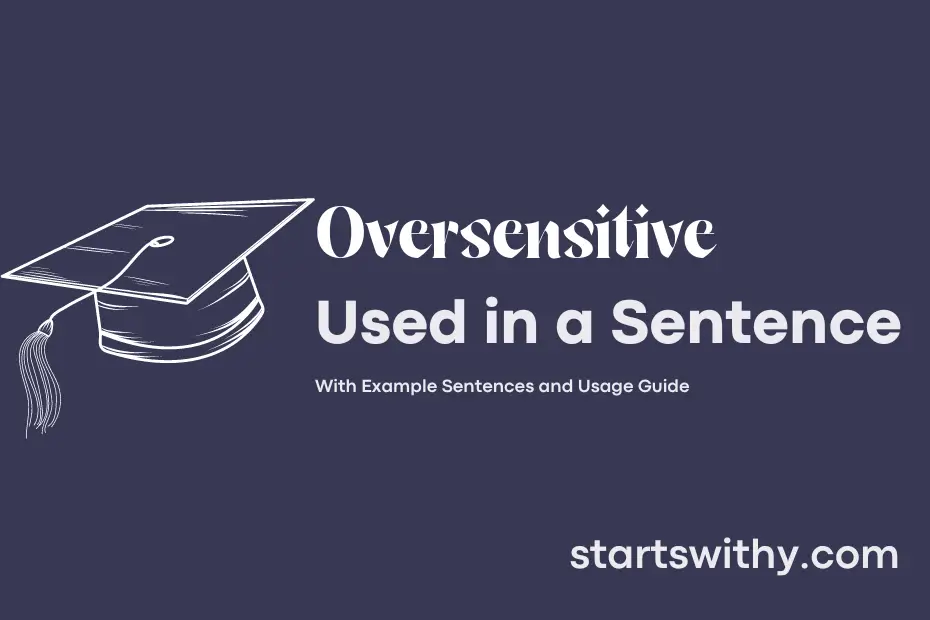Are you easily offended by small things? You might be considered oversensitive. Being oversensitive means reacting strongly to minor stimuli or feeling hurt by things that others may not find bothersome. It often involves getting upset or offended more easily than the average person.
7 Examples Of Oversensitive Used In a Sentence For Kids
- Oversensitive people feel things very deeply.
- It’s important to be gentle with oversensitive friends.
- Sometimes, it’s okay to be oversensitive about things.
- We should be understanding of oversensitive classmates.
- Oversensitive individuals may need extra love and care.
- Let’s be patient with oversensitive family members.
- Remember, it’s okay to be oversensitive sometimes.
14 Sentences with Oversensitive Examples
- Oversensitive individuals may find it challenging to handle criticism during group projects.
- It is important for college students to understand that not everyone will cater to their oversensitive nature.
- Oversensitive reactions to constructive feedback can hinder personal growth and learning.
- Some professors may not have the time or patience to accommodate oversensitive students in every situation.
- It is crucial for oversensitive individuals to develop effective coping mechanisms to navigate the challenges of college life.
- Oversensitive students may struggle to participate in class discussions due to fear of judgment.
- Oversensitive reactions to minor setbacks can escalate stress levels and impact academic performance.
- Feeling constantly oversensitive can lead to feelings of isolation and loneliness among college students.
- Engaging in mindfulness practices can help oversensitive students manage their emotions and thoughts more effectively.
- College can be a valuable opportunity for oversensitive individuals to build resilience and develop a stronger sense of self.
- Seeking support from friends, family, or counseling services can be beneficial for oversensitive students struggling to cope with stress.
- Learning to differentiate between constructive criticism and personal attacks is essential for oversensitive individuals in a college environment.
- Developing a positive outlook and focusing on personal growth can help oversensitive students overcome obstacles in their academic journey.
- Setting boundaries and communicating openly with peers can prevent misunderstandings and alleviate oversensitive reactions in social situations.
How To Use Oversensitive in Sentences?
To use the word Oversensitive in a sentence, start by identifying a situation where someone reacts strongly or emotionally to a minor issue. Here’s an example sentence: “She is so oversensitive that even a small comment can make her upset.” In this sentence, the word “oversensitive” is used to describe someone who is overly reactive or easily offended by things that would not typically provoke such a strong response.
When using the word oversensitive, it’s important to consider the context and tone of the conversation to ensure that it is appropriate and respectful. Avoid using the term in a derogatory or dismissive way, as it can be hurtful to those who may struggle with heightened sensitivity.
Remember that oversensitive is an adjective that modifies a noun. It describes someone who is excessively reactive or responsive to certain stimuli. You can also use oversensitive to describe objects or situations that trigger intense reactions from people.
In summary, using oversensitive in a sentence involves understanding its meaning and using it appropriately in context to describe someone’s heightened sensitivity. Practice incorporating the word into your everyday conversations to become more familiar with its usage and nuances.
Conclusion
In conclusion, handling situations with someone who is oversensitive requires patience, empathy, and clear communication. It is important to choose words carefully and be mindful of their feelings to prevent misunderstandings and conflict. For example, offering constructive feedback in a gentle manner can help avoid triggering an oversensitive response. Moreover, being understanding and validating their emotions can improve relationships and foster a more positive environment.
Recognizing and accommodating oversensitivity can lead to smoother interactions and a more harmonious atmosphere. By adjusting our approach and being sensitive to the needs of others, we can cultivate healthier relationships and create a supportive and inclusive environment for everyone involved. Ultimately, empathy and consideration are key in navigating interactions with those who are oversensitive, promoting understanding and mutual respect.



